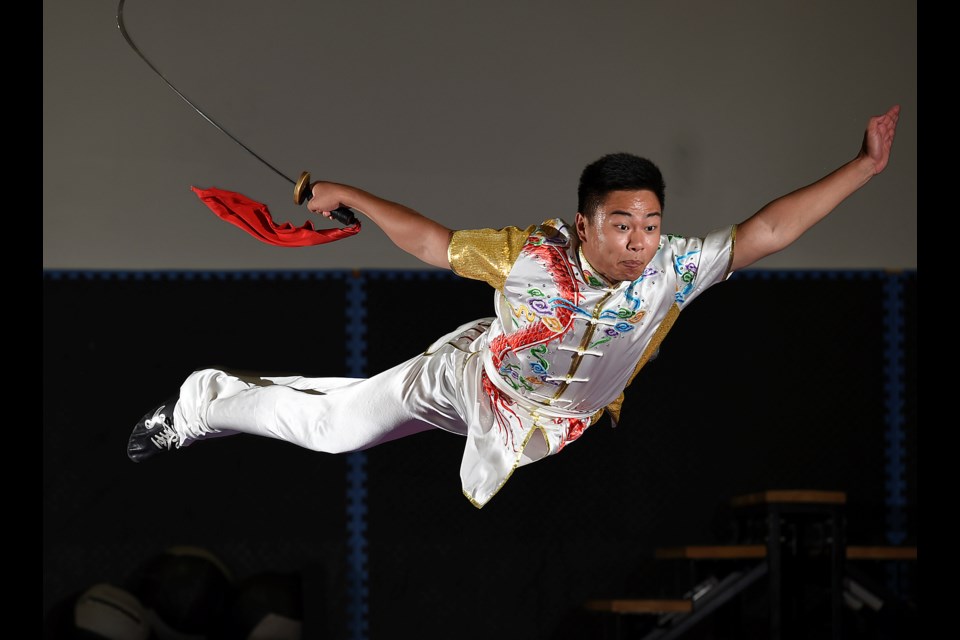Ryan Chan found himself at an impossibly difficult crossroad with a pursuit he’d dedicated most of his life to.
Stepping up to compete at the Canadian Wushu Junior Team Trials in July, the then 17-year-old gave himself two options: win it all on a stage he’s previously faltered on, or pack it in and quit the sport entirely.
Pressure, injuries and past failures be damned, Chan knocked it out of the park. He won three gold medals, upped his ranking to the number two spot in Canada and became the first B.C. resident to ever make the Canadian Junior Wushu Team.
Chan is now headed to Bulgaria this weekend to compete on the biggest stage of his martial arts career as part of the World Junior Wushu Championships that kick off Sept. 25.
“Making the Canadian team is amazing, I don’t even know how to describe it,” Chan said. “What I’ve been training for my whole life is to make this team and now that I’ve finally done it, it’s almost surreal. I’ve been competing for years and I had never made the team. If I didn’t make the team this year I would have probably quit.”
Derived from traditional Chinese martial arts, Wushu, often referred to as kung fu, is a centuries-old method of self-defence that’s recognized as the national sport of China. Several off-shoots, variations and weapons techniques exist within the sport, and some of its highest-profile practitioners include the late Bruce Lee, Jackie Chan and Jet Li.
Competitive Wushu is split across two categories: taolu, which translates to forms, and sanda, which means sparring. Chan specializes in three areas of Wushu: Daoshu sees him employ a butterfly sword, Gunshu is centred around the use of a wooden staff and Changquan is based on bare-fisted movement and form.
In competition, Chan essentially simulates combat scenarios and is judged on his stance, posture, form and execution. All of those performance elements were locked down at July’s team trials, when Chan took gold in Daoshu, Gunshu and Changquan.Ěý
Chan’s biggest achievement to date was a victory eight years in the making, as his previous attempts at cracking the national squad were dashed by injury and anxiety.Ěý
“It was super nerve racking because I really, really wanted to make the team,” he said. “I put in a lot more time into training this year and it paid off.”
Another critical point for Chan’s upward trajectory has been his coach, Wang Heng. The pair partnered up four years ago and changed both his training regimen and his outlook on the sport. Those shifts in method and execution have allowed the Eric Hamber grad to quiet his mind and hone his focus.
“Training with [Heng] is awesome,” Chan said. “She can really pick up things that I don’t think any other coach can pick up. She really brings out my style and my style has developed so much over the years training under her.”
Heng’s status in Wushu circles borders on mythical. She’s the former national broadsword and double broadsword champion of China, and is a seventh degree Wushu Duan Wei — the highest level of mastery attainable in the sport.
Speaking through a translator, Heng credits her student’s renewed resilience as the main reason he was able to finally get over the hump and make the Canadian team after close to a decade of knocking on the door.
“In the past, he had less time to train and he had a lot of injuries,” she said. “He had thought about quitting for a while, but his mom and his coaches have encouraged him to keep going. It’s kept his confidence up to keep going and not give up.”
Chan seems to have no shortage of confidence heading into this weekend. Competing in the 16 to 18 year old grouping, he feels a top-three placement, if not a gold medal, is within reach.
But beyond that, Chan is dreaming bigger — he wants to represent Canada at the highest level possible. Lobbying efforts are ongoing to have Wushu recognized as an Olympic sport within the next eight years and that’s Chan’s end game.
He doesn’t need to look much further than his coach to get there, as Heng’s life reads like a script from an old kung fu movie.
Worried by her tendency to often fall ill, Heng’s parents enrolled her in the Hunan Wushu Institute before she was 10. Her routine involved more than eight hours of training per day and she studied under Ma Chu Xi, who is regarded as one of the top 100 Wushu practitioners in the world.
Heng went on to amass awards and medals by the boatload, both nationally and internationally, before recently relocating to Canada.
She now teaches Wushu at varying locations in Metro Â鶹´«Ă˝Ół»and touts its benefits above and beyond self-defence: flexibility, relaxation and meditation are central tenets to the practice.
Given her ascension in the sport, Heng sees an entirely new level of focus and training in order for Chan to potentially call himself an Olympian.
“In China, some athletes are training every day for more than eight hours,” she said. “He will have to practice much harder to compete against athletes who are professionals in Wushu. That will involve a long journey that we will have to take together.”
The World Junior Wushu Championships run until Oct. 2.
[email protected]Ěý
@JohnKurucz Ěý



